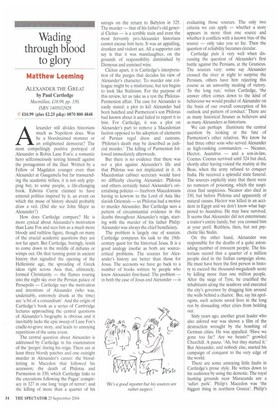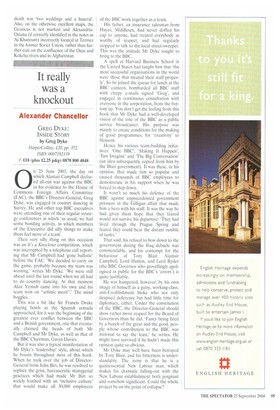Wading through blood to glory
Matthew Leeming
ALEXANDER THE GREAT by Paul Cartledge Macmillan, £18.99, pp. 330, ISBN 1405032928 cr. f16.99 (plus £2.25 p&p) 0870 800 4848 Alexander still divides historians much as Napoleon does. Was he a bloodstained monster or an enlightened democrat? The most compellingly positive portrayal of Alexander is Robin Lane Fox's: a romantic hero selfconsciously testing himself against the protagonists of the Iliad. Written by a Fellow of Magdalen younger even than Alexander at Gaugamela but far transcending the academic milieu, it is not only gripping but, to some people, a life-changing book. Edwina Currie claimed to have entered politics inspired by it, an event on which the muse of history should probably draw a veil. (Did she see John Major as Alexander?)
How does Cartledge compare? He is more cynical about Alexander's motivation than Lane Fox and sees him as a much more bloody and ruthless figure, though on many of the crucial academic questions they are not far apart. But Cartledge, boringly, tends to come down in the middle of debates or wimps out. On that turning point in ancient history that signalled the opening of the Hellenistic age, the spreading of Greek ideas right across Asia that, ultimately, formed Christianity — the flames roaring into the night sky over the Persian palace of Persepolis — Cartledge says the motivation and intentions of Alexander (who was, undeniably, extremely drunk at the time) are 'a bit of a conundrum' And the origin of Cartledge's book as a series of Cambridge lectures approaching the central questions of Alexander's biography is obvious and it inevitably lacks the epic sweep of Lane Fox's cradle-to-grave story, and leads to annoying repetitions of the same event.
The central question about Alexander is addressed by Cartledge in his examination of the `purges' during his reign. There are at least three bloody patches and one outright murder in Alexander's career: the bloodletting in Macedon that followed his accession; the death of Philotas and Parmenion in 330, which Cartledge links to the executions following the Pages' conspiracy in 327 in one long 'reign of terror': and the killing of more than a quarter of his satraps on the return to Babylon in 325. The murder — that of his father's old general Cleitus — is a terrible stain and even the most fervently pro-Alexander historians cannot excuse him here. It was an appalling, drunken and violent act. All a supporter can say is that it was manslaughter, on the grounds of responsibility diminished by Dionysus and unmixed wine.
Cleitus apart, it is Cartledge's interpretation of the purges that decides his view of Alexander's character. To murder one colleague might be a misfortune, but ten begins to look like Stalinism. For the purpose of this review, let us take as a test the PhilotasParmenion affair. The case for Alexander is easily stated: a plot to kill Alexander had been hatched and Parmenion's son Philotas had known about it and failed to report it to him. For Cartledge, it was a plot on Alexander's part to remove a Macedonian faction opposed to his adoption of elements of Persian regal dress and customs. `Philotas's death may be described as judicial murder.' The killing of Parmenion followed immediately afterwards.
But there is no evidence that there was not a plot against Alexander's life and that Philotas was not implicated in it. A Macedonian cabinet secretary would have no difficulty clearing Alexander. Philotas and others certainly hated Alexander's orientalising policies — freeborn Macedonians having to kowtow to the Lord of Asia like slavish Orientals — so Philotas had a motive to murder Alexander. But Cartledge sees a pattern of circumstantial evidence in the deaths throughout Alexander's reign, starting with the murder of his father Philip: Alexander was always the chief beneficiary.
The problem is largely one of sources. Cartledge compares his task to the 19thcentury quest for the historical Jesus. It is a good analogy insofar as both are sourcecritical problems. The sources for Alexander's history are better than those for Jesus. The accounts we have go back to a number of books written by people who knew Alexander first-hand. The problem — in both the case of Jesus and Alexander — is evaluating those sources. The only two criteria we can apply — whether a story appears in more than one source and whether it conflicts with a known bias of the source — only take you so far. Then the question of reliability becomes circular.
Cartledge puts it very well when discussing the question of Alexander's first battle against the Persians, at the Granicus. The sources vary: some say Alexander crossed the river at night to surprise the Persians, others have him rejecting this course as an unworthy stealing of victory. `In the long run.' writes Cartledge, `the answer often comes down to the kind of behaviour we would predict of Alexander on the basis of our overall conception of his outlook and pattern of conduct.' There are as many historical Jesuses as believers and as many Alexanders as historians.
We can perhaps illuminate the central question by looking at the fate of Parmenion's other relatives. We know he had three other sons who served Alexander as high-ranking commanders — Nicanor, Hector, Asandrus — and a son-in-law, Coenus. Coenus survived until 324 but died, shortly after having voiced the mutiny at the Beas, when the army refused to conquer India. He received a splendid state funeral. The sources explicitly state that there were no rumours of poisoning, which the suspicious find suspicious. Nicanor also died in 330, but before Philotas and apparently of natural causes. Hector was killed in an accident in Egypt and we don't know what happened to Asandrus. He may have survived. It seems that Alexander did not exterminate a traitor's entire family, but you crossed him at your peril. Ruthless, then, but not psychotic like Stalin.
On the other hand, Alexander was responsible for the deaths of a quite astonishing number of innocent people. The historians record that a quarter of a million people died in the Indian campaign alone. He must have been the first person in history to exceed the thousand-megadeath score by killing more than one million people. After the siege of Tyre, he crucified the inhabitants along the seashore and executed the city's governor by dragging him around the walls behind a chariot. But, say his apologists, such actions saved lives in the long run by dissuading other cities from holding out.
Sixty years ago, another great leader who also adored war was shown a film of the destruction wrought by the bombing of German cities. He was appalled. `Have we gone too far? Are we beasts?' growled Churchill. A pause. `Ah, but they started it.' But Alexander, and nobody else, started his campaign of conquest to the very edge of the world.
There are some annoying little faults in Cartledge's prose style. He writes down to his audience by using the demotic. The royal hunting grounds near Maracanda are a 'safari park'. Philip's Macedon was 'the biggest thing in northern Greece'. Philip's death was 'two weddings and a funeral'. Also, on the otherwise excellent maps, the Granicus is not marked and AlexandriaOxiana (if correctly identified in the notes as Ai Khanoum) incorrectly located at Termez in the former Soviet Union, rather than further east on the confluence of the Oxus and Kokcha rivers and in Afghanistan.



























































































 Previous page
Previous page